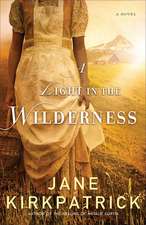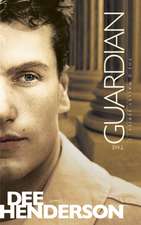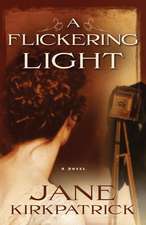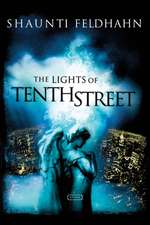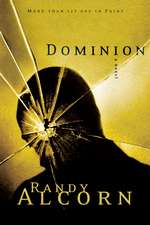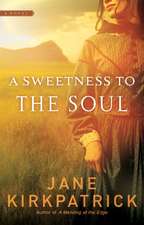Love to Water My Soul: Dreamcatcher (Multnomah), cartea 02
Autor Jane Kirkpatricken Limba Engleză Paperback – 31 aug 2008
A remakable story of God's constancy and provision for all lovers of history, romance and faith...
Based on historical characters and events, Love to Water My Soul recounts the dramatic story of an abandoned white child rescued by Indians. Among Oregon's Paiute people, Shell Flower seeks love and a pace of belonging...only to be cast away from her home.
In the years that follow, she faces a new life in the world of the white man--a life filled with both attachment and loss--yet finds that God faithfully unites her with a love that fills all longing in this heartwarming sequel to Jane Kirkpatrick's award-winner, A Sweetness to the Soul.
Preț: 103.27 lei
Nou
Puncte Express: 155
Preț estimativ în valută:
19.76€ • 20.59$ • 16.36£
19.76€ • 20.59$ • 16.36£
Carte disponibilă
Livrare economică 13-27 martie
Preluare comenzi: 021 569.72.76
Specificații
ISBN-13: 9781590529492
ISBN-10: 1590529499
Pagini: 401
Dimensiuni: 170 x 219 x 27 mm
Greutate: 0.33 kg
Editura: Multnomah Books
Seria Dreamcatcher (Multnomah)
ISBN-10: 1590529499
Pagini: 401
Dimensiuni: 170 x 219 x 27 mm
Greutate: 0.33 kg
Editura: Multnomah Books
Seria Dreamcatcher (Multnomah)
Notă biografică
Jane Kirkpatrick is an Oregon author whose work includes the three novels Love to Water My Soul, A Sweetness to the Soul, and Homestead. A Sweetness to the Soul earned the author and publisher the Wrangler Award from the Western Heritage Center as the "Outstanding Western Novel of 1995." Her award-winning essays have appeared in over fifty magazines and newspapers across the country. She is a clinical social worker, speaker, and teacher. Jane and her husband, Jerry, live on a remote ranch in Eastern Oregon. A Gathering of Finches is the third book in her compelling historical novel series.
Extras
Prologue
Like a double-edged obsidian knife, my life was sliced two ways, and carried with it strength for the task and a keen edge to find my way.
I even carved and shaped my name, deciding Alice M did fit me. But it is Thocmetone that I cherish. It means “Shell Flower” and I received it my third year with the Wadaduka people. It was in 1870 or so. I once wore Asiam, the word the Modocs called me, thought they heard me call myself that name when they first found me wandering and dust-shrouded on the Oregon desert, separated from those most familiar. I added others through the years, but Thocmetone pleased me most for it was given as a gift and as a sign that I was loved.
It is such love that makes things grow, even yellow shell flowers that bob and weave in the desert spring. It is such love that guides and strengthens for a journey. And it is the memory of such love that waters my soul, fills me up enough to let me nourish others.
This is a memory told many times, though for years kept only to myself, tied into a chain of leather knots. When I found what quenched my thirst, I took the necklace off. But I remembered, and tell the story now so you will be encouraged and find through it the way to fill your longings, too.
The First Knot: Marking
The wagon moved away from me in a swirl of dust, the clank of hames and harness, creaking of wooden wheels, shouts through the mid-day Oregon heat. To this day, when I view the back of a woman’s bonnet I see the canvas opening of a wagon disappearing into Oregon Territory, leaving me behind.
Even now, years later, little memories flutter across my mind, often when I least expect them. The smell of hot canvas and broken sage arrives on a day I fill our chuckwagon, preparing for spring branding; a gold chain with crossed bars glittering against a throat of white appears with a flash of sunlight on the ripples of a river. The smell of cabbage from the asylum’s kitchen once brought the memory of my mother’s kraut-covered apron.
Even the fleeting brush of a blanket against my cheek at night reminds me of a military uniform that must have been my father’s. These images come with the speed of a hummingbird’s wing and then flit away, leaving only an empty ache in the wake of their passing.
I must have been in the last wagon.
Like the faint impression a face leaves in a pillow, I remember things as though they are not really there. I imagine more. Like waking to the scent of sagebrush pushing against sunbaked cloth, the noise of bird calls, leather flapping against the oxen’s hides, a dog barking at a rabbit, people coughing through the wagon dust in the distance, my face and arms a sleepy mass of tied-quilt crinkles. It must have been that way.
My mother would have held the reins, driven the team, thin calico stretched across her bony back. She had auburn hair, I think, streaked with lighter shades. It would have peeked out of the O at the back of her dirty blond bonnet.
My father would have ridden somewhere ahead with the train, along with a brother–there must have been a brother–whose face, like my parents, is now foreign.
We were making our way to Oregon and the ocean and a new beginning. I did not know what a beginning was then, but the hope of a new one must have been my father’s dream, one that made him load our beds and blankets into wagons and join with others looking for their new beginnings, too.
And then they were gone.
Who knows why. Did a bird catch my eye while I walked beside the wagon’s wheels? Did I follow it? Was I reaching for something, a dip of water from the barrel? Or maybe just standing at the back, watching junipers and sage pass by, and then fell out? Maybe I slept and walked in my dreams. I paw through my faint memories like a dog seeking last season’s buried bones. I wonder how and why it happened, why I was left alone there in the dust. Nothing rises from my digging. I know only that I sat in dirt the wheels left behind, frightened and alone.
I have seen a spider in the sweet grape arbor suspended from a single strand just before it reached its destination, seen it almost complete its journey, working hard. Perhaps it celebrated in satisfaction, its goal so close. And then I have watched a breeze whisk it away, force it to start again, and been reminded that what we long for can so easily be discarded by some new challenge to our souls, unless we hang on tight to what we wish for.
It was like that for me the day I watched the wagons leave. A sharp spear of pain stabbed me. Pain as piercing as a missing friend, as overwhelming as a lost chance. A pain so quick it stole my breath; so deep, the ache laid heavy on my chest and spread like stains of blood through water.
I must have called to them, shouted, “Mama! Papa! Wait!” I could not stop them, did not stop them. They continued on. In times since I have felt that same heavy fear awash with disappointment.
The wagons rattled through the dust, kept to the ruts as though nothing new had happened, nothing was amiss within their world.
Would I have watched the dust grow ever smaller, tried to follow them on my bare feet? Was I hurt, bruised or injured by a fall? Must not have been injured, I think now, or those who found me would have let me be. But still, the picture of myself as one who simply sat and waited, tears staining my faded dress, does not fit well on these narrow, older shoulders. Neither does the image that I played in powdery dust simply holding hope.
I like to think that I reached out and did not wait to seal my fate. I like to think that I ran after them, my cries lost to the wagon sounds and distance.
But who knows? Some things are forever left to chewing without the satisfaction of a swallow.
The wagon O disappeared in the distance like a dream before dawn. I belonged there, behind that opening. But no longer.
The sunset would have turned a faded pink, the color of my pinafore. Bumps formed on my pale skin and I shivered, must have. Through pinched and swollen eyes, I imagine my father in his gray uniform finding me, looking down at his wayward child, and in his booming voice commanding, “As you were,” as I have memories he once did.
My brother and I would answer, “As I am,” hands clasped behind our backs, legs firm and wide apart, eyes an arrow straight ahead.
“At ease,” he’d say and smile, the memory floating to me on the faint aroma of tobacco.
It is a ritual I recalled often in the days when I first dreamed of finding them if they could not find me, a ritual with strange detail, a memory lost and made again within my longing.
“As I am,” I’d murmur to fall asleep, no one else to sing a lullaby. “As I am” is how I wished to be.
Did I have plans? Yes. I would use my strong, long legs for someone with few years, my contrary ways, to find a way to answer to them once again that I was present, “as I am.”
“They search for you, na?” Lukwsh said years later, her voice always ending in a question.
I imagined that they searched, frantic, like a mother separated from her calf in the Silvies stream in spring, running along the shoreline, bellowing to it as water swirls and twists it, bouncing helpless against the shore, spit back into the current and away.
“White people with big eyes and hair on faces always rush, like water,” Lukwsh told me, her hands pressing wada seeds into riced flour cakes. “Maybe wagons move too far before they see you gone. No time for rushing back to find you. Tibos always race like rivers through rocks, like at Tlhxni,” she said. “Maybe their headmen advised them not to return to find a small child.”
I could not imagine what might keep my father from searching. He would have spent days riding, calling, his shoulders brushing through the blooming sage, his throat parched from the desert air. His hands would have ached with bending greasewood back to look beneath, his throat dry and sore from calling out my name, some name, belonging to his lost child. He would have offered money, maybe even land, to those who had news that I still lived and had not been lost to snakes or Indians or hungry coyotes.
My mother surely would have searched, too, gathered desert dirt beneath her nails hoping to discover some small sign that I still lived. Even my brother might have put aside his interests to look for tracks, if they had let him.
“So you became a gift to Lukwsh,” the woman told me, speaking of herself. Lukwsh, with her kind and toothy smile. Lukwsh, who was a calfless mother before me. But that is a later story, a later knot.
The Modocs found me first and so I was not sitting in the sand for my parents to whisk into their arms if they came looking, when they came looking.
Like a double-edged obsidian knife, my life was sliced two ways, and carried with it strength for the task and a keen edge to find my way.
I even carved and shaped my name, deciding Alice M did fit me. But it is Thocmetone that I cherish. It means “Shell Flower” and I received it my third year with the Wadaduka people. It was in 1870 or so. I once wore Asiam, the word the Modocs called me, thought they heard me call myself that name when they first found me wandering and dust-shrouded on the Oregon desert, separated from those most familiar. I added others through the years, but Thocmetone pleased me most for it was given as a gift and as a sign that I was loved.
It is such love that makes things grow, even yellow shell flowers that bob and weave in the desert spring. It is such love that guides and strengthens for a journey. And it is the memory of such love that waters my soul, fills me up enough to let me nourish others.
This is a memory told many times, though for years kept only to myself, tied into a chain of leather knots. When I found what quenched my thirst, I took the necklace off. But I remembered, and tell the story now so you will be encouraged and find through it the way to fill your longings, too.
The First Knot: Marking
The wagon moved away from me in a swirl of dust, the clank of hames and harness, creaking of wooden wheels, shouts through the mid-day Oregon heat. To this day, when I view the back of a woman’s bonnet I see the canvas opening of a wagon disappearing into Oregon Territory, leaving me behind.
Even now, years later, little memories flutter across my mind, often when I least expect them. The smell of hot canvas and broken sage arrives on a day I fill our chuckwagon, preparing for spring branding; a gold chain with crossed bars glittering against a throat of white appears with a flash of sunlight on the ripples of a river. The smell of cabbage from the asylum’s kitchen once brought the memory of my mother’s kraut-covered apron.
Even the fleeting brush of a blanket against my cheek at night reminds me of a military uniform that must have been my father’s. These images come with the speed of a hummingbird’s wing and then flit away, leaving only an empty ache in the wake of their passing.
I must have been in the last wagon.
Like the faint impression a face leaves in a pillow, I remember things as though they are not really there. I imagine more. Like waking to the scent of sagebrush pushing against sunbaked cloth, the noise of bird calls, leather flapping against the oxen’s hides, a dog barking at a rabbit, people coughing through the wagon dust in the distance, my face and arms a sleepy mass of tied-quilt crinkles. It must have been that way.
My mother would have held the reins, driven the team, thin calico stretched across her bony back. She had auburn hair, I think, streaked with lighter shades. It would have peeked out of the O at the back of her dirty blond bonnet.
My father would have ridden somewhere ahead with the train, along with a brother–there must have been a brother–whose face, like my parents, is now foreign.
We were making our way to Oregon and the ocean and a new beginning. I did not know what a beginning was then, but the hope of a new one must have been my father’s dream, one that made him load our beds and blankets into wagons and join with others looking for their new beginnings, too.
And then they were gone.
Who knows why. Did a bird catch my eye while I walked beside the wagon’s wheels? Did I follow it? Was I reaching for something, a dip of water from the barrel? Or maybe just standing at the back, watching junipers and sage pass by, and then fell out? Maybe I slept and walked in my dreams. I paw through my faint memories like a dog seeking last season’s buried bones. I wonder how and why it happened, why I was left alone there in the dust. Nothing rises from my digging. I know only that I sat in dirt the wheels left behind, frightened and alone.
I have seen a spider in the sweet grape arbor suspended from a single strand just before it reached its destination, seen it almost complete its journey, working hard. Perhaps it celebrated in satisfaction, its goal so close. And then I have watched a breeze whisk it away, force it to start again, and been reminded that what we long for can so easily be discarded by some new challenge to our souls, unless we hang on tight to what we wish for.
It was like that for me the day I watched the wagons leave. A sharp spear of pain stabbed me. Pain as piercing as a missing friend, as overwhelming as a lost chance. A pain so quick it stole my breath; so deep, the ache laid heavy on my chest and spread like stains of blood through water.
I must have called to them, shouted, “Mama! Papa! Wait!” I could not stop them, did not stop them. They continued on. In times since I have felt that same heavy fear awash with disappointment.
The wagons rattled through the dust, kept to the ruts as though nothing new had happened, nothing was amiss within their world.
Would I have watched the dust grow ever smaller, tried to follow them on my bare feet? Was I hurt, bruised or injured by a fall? Must not have been injured, I think now, or those who found me would have let me be. But still, the picture of myself as one who simply sat and waited, tears staining my faded dress, does not fit well on these narrow, older shoulders. Neither does the image that I played in powdery dust simply holding hope.
I like to think that I reached out and did not wait to seal my fate. I like to think that I ran after them, my cries lost to the wagon sounds and distance.
But who knows? Some things are forever left to chewing without the satisfaction of a swallow.
The wagon O disappeared in the distance like a dream before dawn. I belonged there, behind that opening. But no longer.
The sunset would have turned a faded pink, the color of my pinafore. Bumps formed on my pale skin and I shivered, must have. Through pinched and swollen eyes, I imagine my father in his gray uniform finding me, looking down at his wayward child, and in his booming voice commanding, “As you were,” as I have memories he once did.
My brother and I would answer, “As I am,” hands clasped behind our backs, legs firm and wide apart, eyes an arrow straight ahead.
“At ease,” he’d say and smile, the memory floating to me on the faint aroma of tobacco.
It is a ritual I recalled often in the days when I first dreamed of finding them if they could not find me, a ritual with strange detail, a memory lost and made again within my longing.
“As I am,” I’d murmur to fall asleep, no one else to sing a lullaby. “As I am” is how I wished to be.
Did I have plans? Yes. I would use my strong, long legs for someone with few years, my contrary ways, to find a way to answer to them once again that I was present, “as I am.”
“They search for you, na?” Lukwsh said years later, her voice always ending in a question.
I imagined that they searched, frantic, like a mother separated from her calf in the Silvies stream in spring, running along the shoreline, bellowing to it as water swirls and twists it, bouncing helpless against the shore, spit back into the current and away.
“White people with big eyes and hair on faces always rush, like water,” Lukwsh told me, her hands pressing wada seeds into riced flour cakes. “Maybe wagons move too far before they see you gone. No time for rushing back to find you. Tibos always race like rivers through rocks, like at Tlhxni,” she said. “Maybe their headmen advised them not to return to find a small child.”
I could not imagine what might keep my father from searching. He would have spent days riding, calling, his shoulders brushing through the blooming sage, his throat parched from the desert air. His hands would have ached with bending greasewood back to look beneath, his throat dry and sore from calling out my name, some name, belonging to his lost child. He would have offered money, maybe even land, to those who had news that I still lived and had not been lost to snakes or Indians or hungry coyotes.
My mother surely would have searched, too, gathered desert dirt beneath her nails hoping to discover some small sign that I still lived. Even my brother might have put aside his interests to look for tracks, if they had let him.
“So you became a gift to Lukwsh,” the woman told me, speaking of herself. Lukwsh, with her kind and toothy smile. Lukwsh, who was a calfless mother before me. But that is a later story, a later knot.
The Modocs found me first and so I was not sitting in the sand for my parents to whisk into their arms if they came looking, when they came looking.
Recenzii
“Rich with sensory imagery, well-developed characters, and peppered with native words, the novel brings alive the traditional and transitional lives of the native people of Oregon in the late nineteenth century.”
- Christian Library Journal for Love to Water My Soul
“[Love to Water My Soul] is impossible to put down… Kirkpatrick’s prose is chiseled with wrenching images that draw one into the story and engage one’s senses… Jane Kirkpatrick has written another fine western novel.”
- Persimmon Hill magazine
“Like a tumbleweed blown by a desert wind, this book carries the reader along. The wide space of Oregon history and the inner space of personal growth fill the pages of this treasure of a book. It is about the individual and community, the internalizing of values reflected from one’s childhood family, and the journey toward wholeness that most of us make.”
- Sally White, Scio Public Library, for Love to Water My Soul
“A romance, a chronicle of family life, a study of relations between white settlers and reservation Indians, A Sweetness to the Soul is a deceptively simple book that touches something deep in the reader. The best novels leave the reader changed in some significant way. Sweetness does that literally from its opening pages… It is a celebration of those things that connect us, that make us what we are, that give us joy, and sorrow, and understanding. This book will touch your soul.”
- Statesman Journal
- Christian Library Journal for Love to Water My Soul
“[Love to Water My Soul] is impossible to put down… Kirkpatrick’s prose is chiseled with wrenching images that draw one into the story and engage one’s senses… Jane Kirkpatrick has written another fine western novel.”
- Persimmon Hill magazine
“Like a tumbleweed blown by a desert wind, this book carries the reader along. The wide space of Oregon history and the inner space of personal growth fill the pages of this treasure of a book. It is about the individual and community, the internalizing of values reflected from one’s childhood family, and the journey toward wholeness that most of us make.”
- Sally White, Scio Public Library, for Love to Water My Soul
“A romance, a chronicle of family life, a study of relations between white settlers and reservation Indians, A Sweetness to the Soul is a deceptively simple book that touches something deep in the reader. The best novels leave the reader changed in some significant way. Sweetness does that literally from its opening pages… It is a celebration of those things that connect us, that make us what we are, that give us joy, and sorrow, and understanding. This book will touch your soul.”
- Statesman Journal
Descriere
"Love to Water My Soul" recounts the dramatic story of an abandoned white child rescued, and then rejected, by Indians. Ultimately God unites her with a love that fills her longing in this sequel to "A Sweetness to the Soul."


